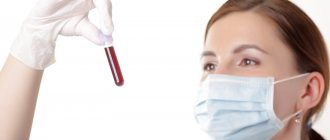Every woman with the onset of menstruation should make it a rule to visit a gynecologist at least once every six months, and also as needed if strange symptoms appear. Preventative examinations with a gynecologist are important, even if there are no unclear symptoms. They make it possible to identify pathologies when they have just appeared, or to ensure their absence, to select the optimal means of contraception, or to determine pregnancy. Is it possible to go to the gynecologist with menstruation? Is it really necessary or is it possible to delay visiting a female doctor until they are over?
During menstruation
Often women are interested in whether it is possible to go to the gynecologist during menstruation. If there are no troubling conditions, then it is better to postpone going to the doctor until they are completely over. It should also be noted that it is better to choose a day so that it does not coincide with the beginning of the discharge.
If you ask a specialist on what day of the cycle to go for an examination, he will determine approximately the second or third day after the end of menstruation. This is due to the fact that examination is difficult during menstruation. Accordingly, to the question whether it is possible to go to a gynecologist with menstruation, the answer will be negative, but provided that nothing bothers the patient.
During menstruation, examination by a gynecologist is complicated for the following reasons:
- Conditions will not be created for a good visual assessment of the condition of the organs of the reproductive system;
- The doctor will not be able to take biological materials for research;
- During menstruation, the mucous membrane is in an inflamed state, so it can react painfully to the actions of the gynecologist;
- The composition of the microflora changes, which significantly complicates the process of making a correct diagnosis.
When answering the question of whether a gynecologist takes medication during menstruation, the answer will be positive, but it is worth understanding that such actions must be justified by the patient’s poor health, and there is also a risk of incorrectly identifying the disease.
How is a gynecological examination performed in women?
The gynecologist checks virgins by inserting a finger into the girl's rectum while she lies on a chair. This way he examines the genitals, without penetrating the vagina. If there are no complaints, the inspection is completed.
If the girl is already sexually active, the examination is carried out by a gynecologist on a chair using a mirror. If something suspicious is detected or if there are complaints, an additional examination is required, which will allow a correct diagnosis to be made. The following diagnostic methods are necessary: taking a smear from the vagina, urine and blood tests, ultrasound. The gynecologist also examines women who have given birth, but uses a larger mirror.
A gynecological examination makes it possible to give a qualitative assessment of the condition of the internal genital organs using the following methods: visually (using a mirror), by palpation, ultrasound diagnostics and laboratory research methods. Visually, the doctor can see the condition of the vagina and cervix, the nature of the discharge (consistency, quantity, color). By palpation, the position of the cervix of the reproductive organ, fallopian tubes, and ovaries is determined. At the end of the examination, he will take a smear to determine the vaginal microflora and the presence/absence of infections.
https://youtu.be/9pX9QG3UNoU
When to visit
As mentioned earlier, regular visits to a female doctor are the key to confidence in the health of the reproductive system and genital organs. Timely research and routine examination make it possible to identify pathology at the initial stage, which significantly simplifies the treatment process and guarantees a quick recovery.
Based on this, many are interested in which day of the cycle to go to the gynecologist. The optimal time for visiting would be 2-3 days after the end of your period. However, there are exceptions to all the rules, and the patient may have an urgent need to visit a doctor during menstruation.
A positive answer to the question whether it is possible to go to a gynecologist during menstruation will be in the following cases:
- The woman has been experiencing continuous bleeding for eight days;
- Menstrual bleeding is irregular, periods are either too long or too short (less than three days);
- Before menstruation, a woman feels severe pain in the mammary glands and lower abdomen, there is irritability, apathy, and depression;
- There is a feeling of itching and burning in the genitals;
- Unnatural mucus is released from the vagina, there is an unpleasant odor;
- The labia majora are swollen, thickened, there is a rash and irritation;
- During sexual intercourse there is pain that does not go away after its completion;
- A gynecologist examines during menstruation if, during urination, a woman feels a pain and burning sensation that does not go away for a long time;
- The mammary glands became compacted, the nipples became deformed, and secretions began to be released from them.
Women who have recently given birth to a child should pay special attention to the state of their reproductive system. The fact is that after this the body is weakened and susceptible to infection, and if their condition worsens, such patients should not even wonder whether it is possible to visit a gynecologist during menstruation, because the visit cannot be postponed.
Many women are interested in when to go to the gynecologist after menstruation. It all depends on the purpose of the visit, as well as the individual length of the cycle. If this is a regular preventive examination, then you can wait 2-3 days; to take smears for microflora, it is better to postpone the visit for 6-7 days, but an ultrasound must be done within 10-14 days from the start of the cycle. If necessary, the doctor may prescribe an ultrasound during menstruation.
How to prepare for a visit to the gynecologist
If a woman needs to visit a gynecologist for monthly discharge, she should prepare herself psychologically. The day before the examination, it is better to refuse sexual intercourse. Otherwise, a small amount of seminal fluid will remain if protection was not used. This will make it difficult to make a diagnosis.
A woman should wear clean and comfortable underwear. It is prohibited to use any deodorants or perfumes on the intimate area. The bladder must first be emptied. Otherwise, there will be unpleasant sensations during the examination.
Many ladies, especially young girls and virgins, are afraid or embarrassed to attend an antenatal clinic. But throughout the entire civilized world, only those who do not take proper care of themselves and their health are condemned. Therefore, today it is correct and fashionable to visit specialized specialists. And such a trend cannot but rejoice.
It all starts with a normal conversation. The doctor collects primary information about the patient and studies the card, if there is one. As a standard procedure, the specialist will definitely find out the reason for the visit and inquire about the time of menstruation and its regularity.
In the absence of a card or any other documents, the doctor is obliged to ask about past illnesses, abortions, operations, pregnancies and childbirths, medications taken, etc. All information that the woman provides to the doctor is strictly confidential, because it is impossible to hide or withhold anything no need for a doctor. And also don’t be afraid or embarrassed to ask questions. You can prepare a list in advance so that you don’t miss anything during your visit.
Urgent visit
When to go to the gynecologist, if there are no problems and the general state of health is good, a woman can decide on her own. However, in life there are often situations when the disease occurs suddenly, and then the question of whether it is possible to go to the gynecologist with menstruation does not even arise.
The girl should immediately go to the doctor if the following conditions or circumstances exist:
- Too frequent urination, there are bloody spots in the urine, there is cutting pain and burning.
- There is a sharp nagging pain in the lower abdomen or groin.
- A gynecologist can be visited during menstruation if the painful syndrome is accompanied by increased body temperature, fever, and nausea.
- If there is an unpleasant odor from the vagina and an increase in the volume of natural discharge. If you have recently had surgery or an abortion.
- An examination by a gynecologist during menstruation is necessary if large blood clots are detected in the discharge.
- The menstrual cycle is excessively long, about 50 days.
- In the period between the last and next menstrual flow, a woman experiences bloody discharge with a pronounced unpleasant odor.
If there are one or more of the symptoms that have just been described, the patient should not wonder whether it is possible to see a gynecologist with her period. In this condition, an examination and consultation with a doctor is extremely necessary, since there is a high probability that the girl’s serious pathology is progressing.
Before your period
You can also often come across a question regarding whether it is possible to go to a gynecologist before your period. Many women know their cycle and doubt whether such a visit will be right. Experts also have the correct answer in relation to this situation.
It must be said that more than 40% of the fair sex experience severe pain in the lower abdomen before the onset of menstrual bleeding. There are doctors who characterize this condition as normal, and the only advice from them is the recommendation to take a painkiller to eliminate the discomfort.
Yes, in certain situations such a condition can indeed be natural, but sometimes it indicates the development of a serious illness. Accordingly, a logical question arises: when is it better to go to the gynecologist, before or after menstruation? It is clear that when you contact a doctor, he will advise you to make several visits on different days of the cycle.
For example, it is not uncommon for a woman to experience severe pain in the lower abdomen before menstrual bleeding, and during diagnostic procedures, doctors identified certain hormonal imbalances. Those who previously had no signs of dysmenorrhea should pay special attention to the appearance of pain.
When is the best time to see a gynecologist if you have such symptoms, your doctor can advise you, but experts often recommend coming before menstrual bleeding starts. Pain in this period is often a sign of the development of an inflammatory process, an infectious lesion, or a tumor on the reproductive organs.
Also asking the question, during menstruation, is it possible to go to the gynecologist if the described symptoms occur, the answer to it will be definitely positive. The fact is that this way the doctor will be able to identify the disease at an early stage, after all. For example, if uterine fibroid develops, the start of treatment cannot be delayed even for one day.
Some girls are afraid and do not want to visit gynecologists. They believe that if nothing bothers them, then a visit to the doctor will be pointless. Experts have a different opinion on this matter, because it is better to come and make sure you are in excellent health. Why neglect a visit and not know about the hidden course of the pathological process.










